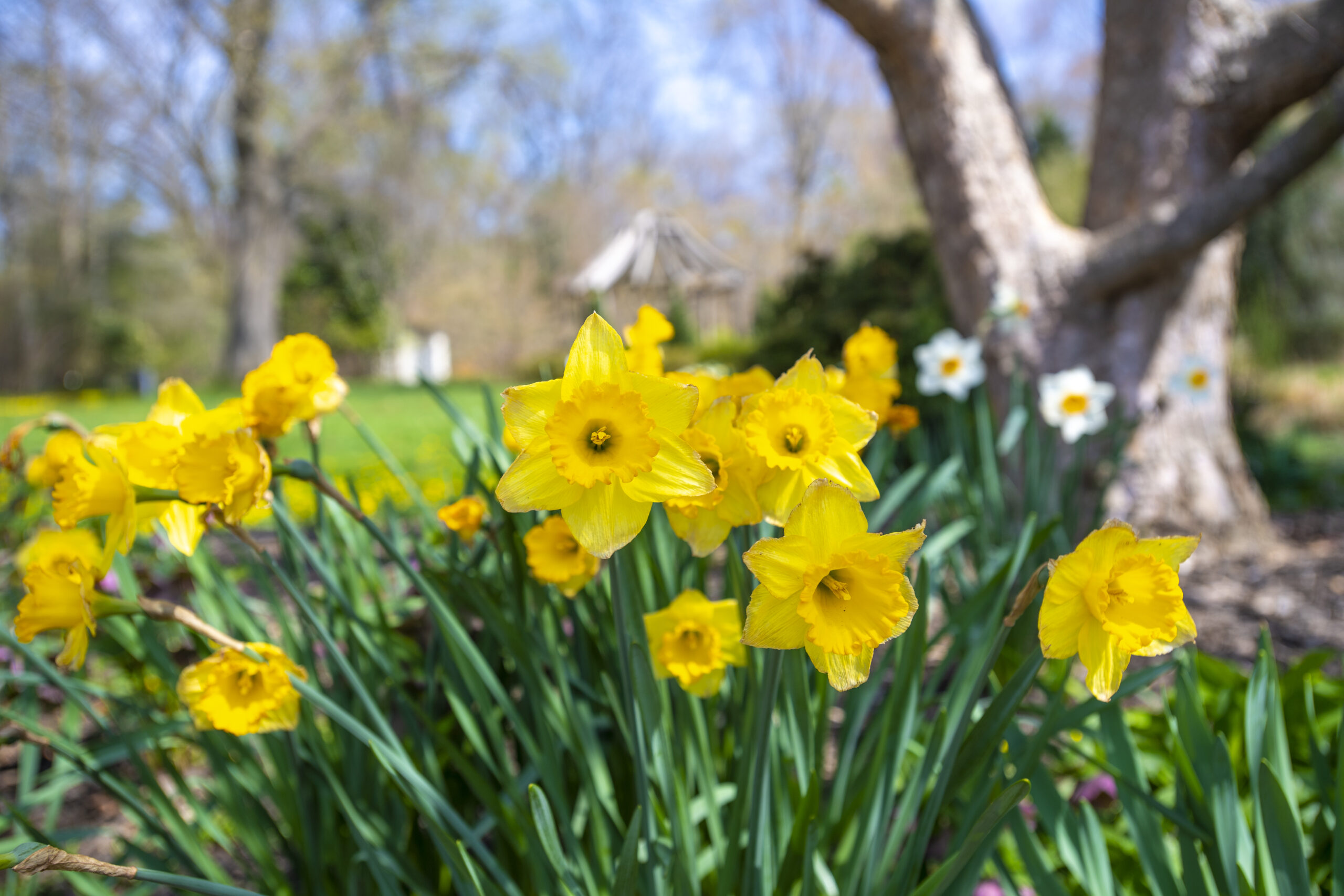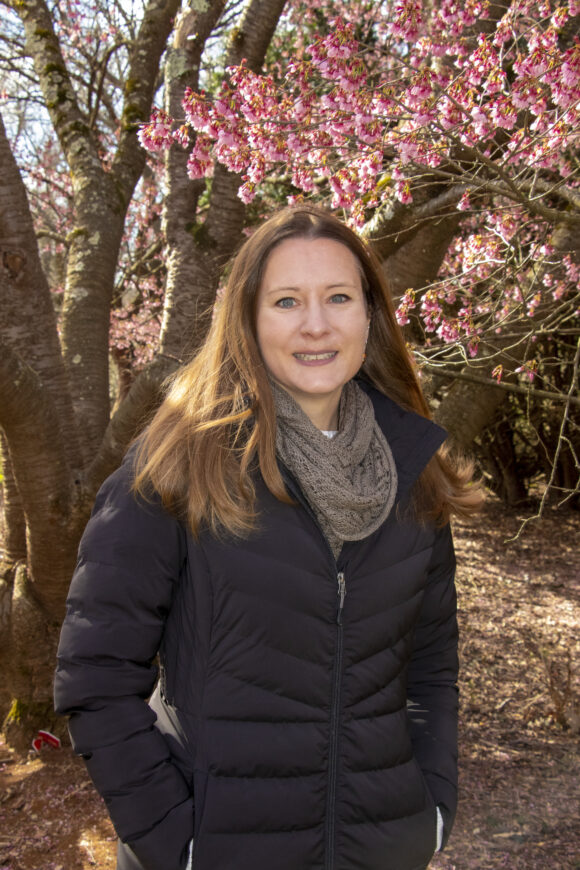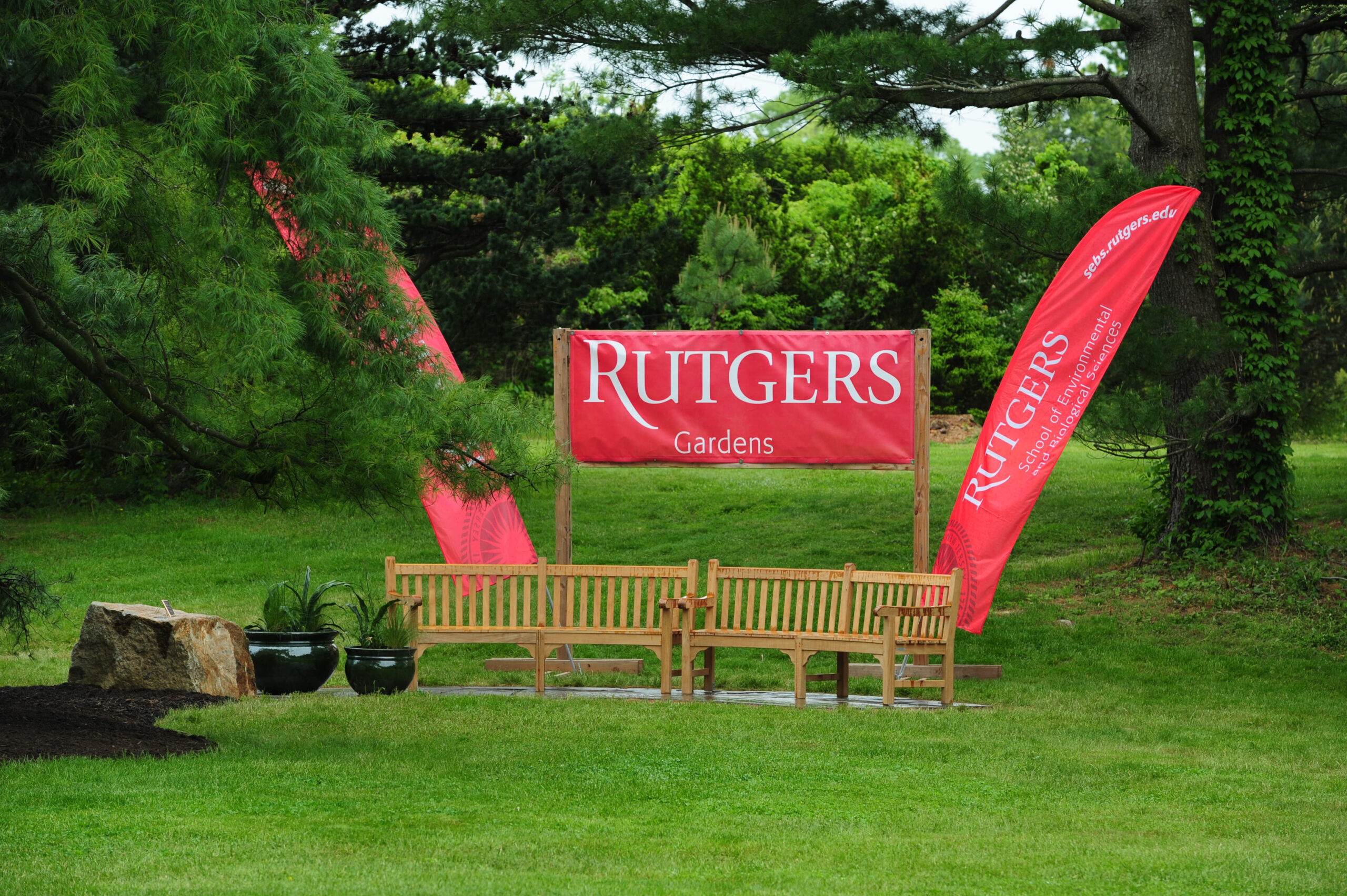
Daffodils bloom at Rutgers Gardens. Photo credit: Nick Romanenko.
Five years ago, Rutgers Gardens received the prestigious designation as a Horticultural Landmark by the American Society for Horticultural Science (ASHS), raising its profile as a leading public garden in New Jersey and the region.
With the presentation of the coveted brass commemorative plaque on April 4, 2017, Rutgers Gardens joined an elite group of horticultural sites like the New York Botanical Garden, the United States Botanic Garden in Washington, D.C., and Monticello, President Thomas Jefferson’s home in Virginia, which received the ASHS’ first Horticultural Landmark designation. Initiated in 1996, the ASHS Horticultural Landmark program was established to commemorate sites of horticultural accomplishments, selected for historical, scientific, environmental and aesthetic value.
Rutgers Gardens has grown from its humble origins when 35.7 acres of land—known as Wolpert Farm—was purchased on May 17, 1916, from Jacob and Celia Lipman. It was intended as a functional education space for local farmers to learn about ornamental horticulture, a new industry trend at the turn of the century. Today, Rutgers Gardens has grown to include more than 180 acres of both maintained and natural areas, evolving over time from research farm to public garden that today embraces biodiversity via its gardens and plant collections.

Lauren Errickson, director of Rutgers Gardens. Photo credit: Jennifer Simon.
Lauren Errickson, who has been engaged in the development, management, and evaluation of multifaceted nutrition, agriculture, and food access programs at Rutgers Cooperative Extension since 2016, was named director of Rutgers Gardens on January 3, 2022 by Laura Lawson, interim executive dean of Agriculture and Natural Resources at Rutgers.
Lawson underscored the vision of the Gardens as a critical contributor to Rutgers’ commitment to diversity and inclusion when making her announcement of the new Gardens director. “As we strengthen our educational and outreach capacity at the Gardens, post-pandemic, we are committed to expanding the diversity of its visitors and researchers, and intentionally engaging and welcoming people who may not historically have known about this amazing green space.”
Errickson took the opportunity of the five-year anniversary of the ASHS Horticultural Landmark designation to answer a few questions about her vision for more fully integrating the botanical site.
You are leading the Gardens at a crucial time in its evolution. What do you see as among your primary tasks?
The plant collections and natural areas on site have historically been, and will remain, central to the mission and purpose of Rutgers Gardens. I see a key aspect of my role to be conscientious stewardship of these important resources, while at the same time making the space more accessible and available to the public and the university community. We have the potential to demonstrate a blend of long standing horticultural traditions and innovative ecological gardening practices, and through community engagement and access to green space we can improve wellbeing for New Jersey residents. In short, I hope to help Rutgers Gardens emerge from the COVID-19 pandemic as a safe, welcoming place of beauty and enjoyment for all.
As a vital part of a land-grant institution, how does the Gardens meet the mission of teaching, research, and service in the 21st century?
For university students, hands-on, experiential learning opportunities are incredibly important. The internship program at Rutgers Gardens gives students the chance to apply the academic and research principles they experience in the classroom in a practical setting. Students learn various aspects of public garden management through real-time garden operations. The natural areas on site, such as Helyar Woods, are ecological “living laboratories” that offer experiences not otherwise readily available on our main urbanized campus. There is also a lot of potential to engage students of the social sciences and the arts at Rutgers Gardens through service learning opportunities throughout the year.
In terms of research, Rutgers Gardens is part of a strong horticultural tradition in New Jersey, and that is increasingly reflected in our public display gardens. We have a unique opportunity to display the products of agricultural and horticultural research, such as the Rutgers-developed Scarlet Fire® dogwood, in a public setting where New Jersey residents can learn about new varieties, ecological services of plants, and much more. To give another example, through a new collaboration with the research-focused botanic garden, Mount Cuba Center, we are very excited to bring to Rutgers Gardens a new collection of lacecap hydrangeas that topped their research trials as beneficial pollinator plants.
Service is going to be an integral part of our work at Rutgers Gardens going forward. My academic background spans environmental and nutritional sciences, so I am very interested in developing initiatives that improve community well-being through increased access to green spaces and healthy food. We already have food security efforts underway through the Rutgers Gardens Student Farm, which grows fresh vegetables for the Rutgers Student Food Pantry in a unique students-feeding-students collaboration.
Access to the Gardens has emerged as an important issue for Rutgers community and the public. What have been some of the steps to amplify this issue?
A lot of momentum was built from the celebratory March to Rutgers Gardens that was held in September 2021 and that featured ecology-inspired music and storytelling along a two-mile walk from campus to the Gardens. Since this event, an ongoing collaboration between the School of Environmental and Biological Sciences, Mason Gross School of the Arts, Douglass Residential College, and School of Engineering at Rutgers has been underway. Students involved in the partnership are currently focused on designing accessible paths and a potential footbridge across Ryders Lane to connect the main part of Cook Campus to Rutgers Gardens. This level of access would ensure safe, ongoing use of the Gardens by the university and local community, and most importantly, connecting the dots among people, plants and ecology.
One of the highly anticipated activities is the annual Rutgers Gardens plant sale. What can the public look forward to this year?
We are very excited for the return of the Spring Flower Fair plant sale at the Log Cabin on Mother’s Day weekend, May 6-8. In addition to having plants for sale on Saturday and Sunday, we’re planning to have local food vendors on site to offer lunch on those days. On Friday, May 6, Cook’s Market will be open for the first day of the summer farmers market season. Rutgers Gardens is also pleased to announce that we will be able to accept SNAP benefits as payment for eligible food items at Cook’s Market this year, an initiative that we hope will increase fresh food access for local residents throughout the year.
How can the community support the various initiatives of Rutgers Gardens?
Rutgers Gardens relies on donations to support the educational opportunities available to our student interns, preservation of our plant collections, and beautification of our garden spaces so that they can be enjoyed by all. We gratefully accept contributions year-round, and gifts made to Rutgers Gardens are tax-deductible. We are currently redeveloping our membership and memorial programs to offer more ways to get involved with supporting Rutgers Gardens. We welcome volunteers for various initiatives throughout the seasons, and of course encourage everyone to visit the Gardens to see all that we have to offer.

Alumni bench dedicated at the centennial celebration of Rutgers Gardens in 2016. Photo credit: Nick Romanenko.

